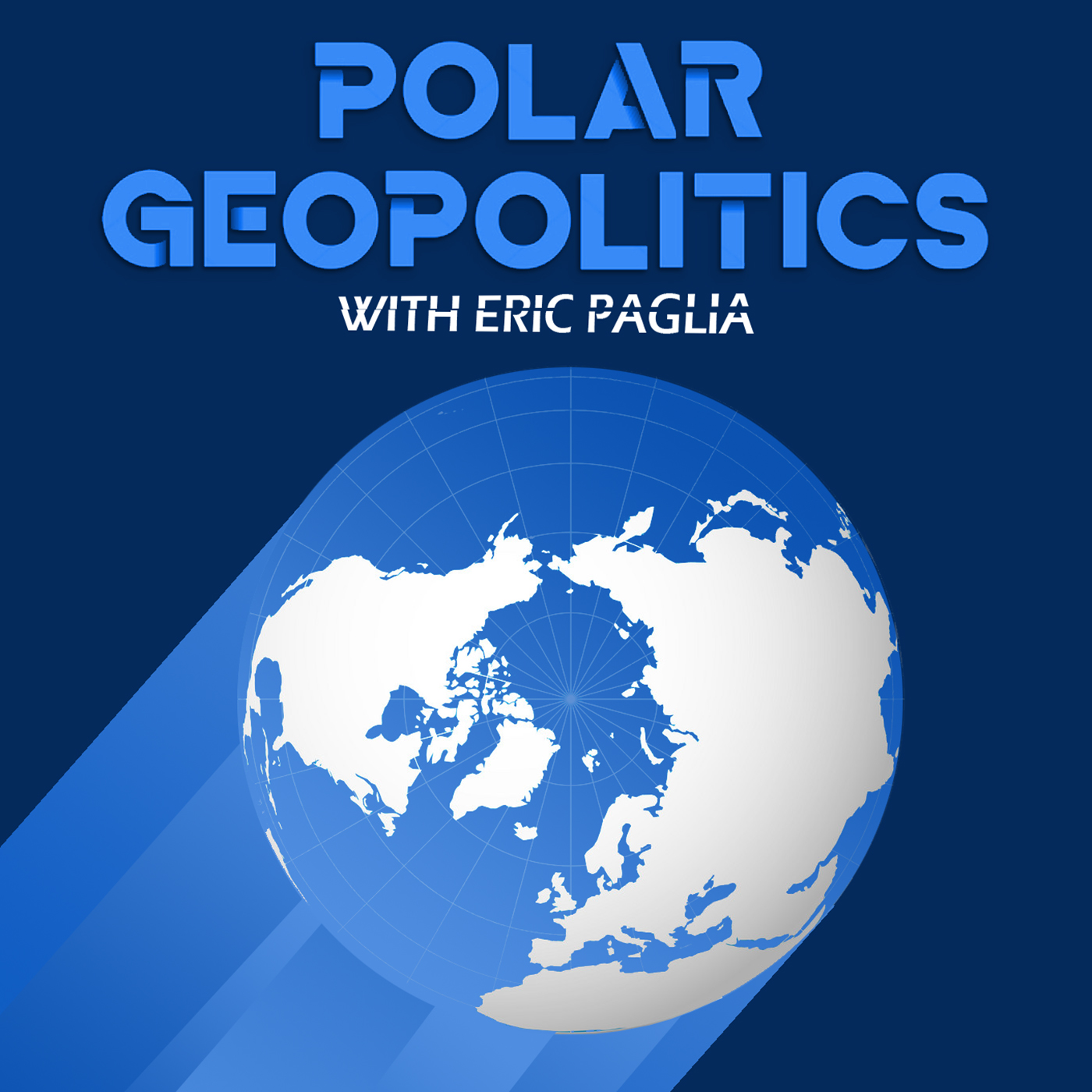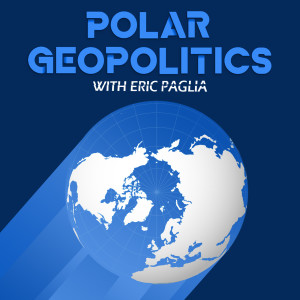
A podcast on the Arctic and Antarctica that applies the lens of geopolitics to analyze a wide range of critical issues pertaining to the polar regions and international affairs. In interviews with leading experts, recurring topics include Greenland, the Arctic Council, climate change, critical raw materials, the Antarctic Treaty System, hybrid warfare, science diplomacy, great power competition between the United States, China and Russia, sustainable development, Svalbard, NATO, Arctic shipping, Alaska, AI, technology and critical infrastructure, the Baltic Sea, military and national security, energy, the role of indigenous peoples in Arctic governance, and more. Polar Geopolitics is hosted by Dr. Eric Paglia, a podcast producer and environmental historian at KTH Royal Institute of Technology in Stockholm, Sweden.
A podcast on the Arctic and Antarctica that applies the lens of geopolitics to analyze a wide range of critical issues pertaining to the polar regions and international affairs. In interviews with leading experts, recurring topics include Greenland, the Arctic Council, climate change, critical raw materials, the Antarctic Treaty System, hybrid warfare, science diplomacy, great power competition between the United States, China and Russia, sustainable development, Svalbard, NATO, Arctic shipping, Alaska, AI, technology and critical infrastructure, the Baltic Sea, military and national security, energy, the role of indigenous peoples in Arctic governance, and more. Polar Geopolitics is hosted by Dr. Eric Paglia, a podcast producer and environmental historian at KTH Royal Institute of Technology in Stockholm, Sweden.
Episodes

Tuesday Apr 02, 2024
Tuesday Apr 02, 2024
In this episode of the Polar Geopolitics podcast, recorded live at the 2024 Arctic Frontiers conference in Tromsø, Norway, host Eric Paglia interviews Andreas Østhagen of the Fridtjof Nansen Institute and Kelsey Frazier from the Ted Stevens Center for Arctic Security Studies. The discussion ranges from global trends affecting the geopolitical position of the Arctic and local security issues specific to Alaska and the Barents Sea region, to the real and anticipated effects of climate change, the challenge of changing sea ice conditions and other maritime issues such as domain awareness, seabed claims and seabed mining, and the pressing need for investments in assets like port infrastructure and polar security cutters.

Monday Mar 25, 2024
Monday Mar 25, 2024
To analyze the transformed security environment in Northern Europe since the NATO accession of Sweden and Finland, this episode features an interview with Minna Ålander, research fellow at the Finish Institute of International Affairs in Helsinki. The in-depth discussion, at time when the Nordic countries have been engaged with their NATO partners in the major Nordic Response 2024 military exercise, covers the interconnections between the Arctic and Baltic regions from a security standpoint, Nordic and US defense cooperation, the integration of Finland and Sweden into the NATO command structure, Finnish relations with China, and the hybrid warfare tactics that have been employed in the Baltic Sea and Finland’s border with Russia.

Thursday Feb 01, 2024
Ian Bremmer on Antarctica and the geopolitics of the polar regions
Thursday Feb 01, 2024
Thursday Feb 01, 2024
Dr. Ian Bremmer, president and founder of Eurasia Group and GZERO Media, joins the podcast to discuss Antarctica and the short- and long-term impacts of climate change and the emerging green transition on the geopolitics of the polar regions. Dr. Bremmer, who recently returned from a trip to Antarctica, also explains how the six-decade success story of the Antarctic Treaty System could provide a precedent for the global governance of outer space in the years ahead.

Friday Jan 05, 2024
Friday Jan 05, 2024
Anu Fredrikson, Executive Director of Arctic Frontiers and former director of the Arctic Economic Council, joins the podcast to discuss sustainable development, economic opportunities and the Green Transition that is taking place in the Arctic alongside structural changes in the regional security environment. With the annual Arctic Frontiers conference coming up in the end of January, Anu Fredrikson also takes up some of the Big Picture themes that will animate discussions in Tromsø, such as Global Actions/Arctic Reactions, Arctic Security-Local Resilience, Navigating Arctic Realities, and Rethinking Arctic Development.

Friday Nov 10, 2023
Friday Nov 10, 2023
The deployment of subsea data cables across different marine areas of the circumpolar North has become a significant development in discussions of Arctic geopolitics. Meanwhile security concerns over subsea infrastructure have become heightened by recent incidents involving the disruption and destruction of energy pipelines and telecommunication cables in the Baltic Sea. Nima Khorrami, a research associate at the Arctic Institute, joins the podcast to explain why data cables are crucial for the economic development of the Arctic, and how the expansion of subsea infrastructure entails the need for an enhanced security presence in the region, perhaps on the part of NATO. The episode also includes a discussion on the recent announcement that Dubai-based DP World will partner with Russia in developing the Northern Sea Route, and whether this signals a new interest in the Arctic among middle eastern countries such as the United Arab Emirates.

Friday Oct 06, 2023
Russia, security and the effects of NATO enlargement in the Arctic
Friday Oct 06, 2023
Friday Oct 06, 2023
The security situation in the Arctic has changed significantly since Russia’s invasion of Ukraine, although the military buildup in the region began well before 2022. Katarzyna Zysk, professor of International Relations and Contemporary History at the Norwegian Institute for Defence Studies, joins the podcast to discuss Russia’s military posture in the Arctic, the effects of NATO enlargement, and the overall geopolitical situation in the region, including the role of China and Russia’s efforts to reach out to other non-Arctic states. Prof. Zysk also explains how various technologies, such as drones and artificial intelligence, will shape the Arctic security environment in the years ahead.

Friday Jun 16, 2023
Friday Jun 16, 2023
The recently destroyed Kakhovka Dam and the nearby Zaporizhzhia Nuclear Power Station are inextricably linked legacies of Soviet energy infrastructure that have become major concerns in the midst of the war in Ukraine. Achim Klüppelberg from the Nuclear Waters project at KTH Royal Institute of Technology is an expert on nuclear energy in Ukraine and Russia, and he joins the podcast to provide an in-depth analysis of the dire situation in the lower-Dnieper region. He also explains the enduring risks and complexities surrounding nuclear energy and infrastructure in the post-Soviet space, including Chernobyl, and discusses an array of nuclear issues related to the Russian Arctic.

Monday May 22, 2023
Alaska: Energy, security and political economy in the American Arctic
Monday May 22, 2023
Monday May 22, 2023
The United States is an Arctic country on account of Alaska, which has for almost 50 years been a major domestic source of oil and natural gas, facilitated by the extensive Trans-Alaska Pipeline System. Alaska has thus been critical for US energy security, as well as national defense due to its close proximity to Russia. However, despite popular perceptions and controversial projects such as Willow, the dominance of the oil industry in Alaska has declined in recent years. Dr. Philip Wight, assistant professor at the University of Alaska at Fairbanks and an expert on Alaska’s energy infrastructure, joins the podcast to discuss an array of issues related to Alaska and the Arctic, including the changing role of oil in the state’s political economy, environmental concerns connected to the extraction of energy and mineral resources, the importance of the massive military presence in the state, and the enduring tensions between Alaska and the US federal government. He also provides a comparison between Alaska and other sub-regions in the circumpolar North.
